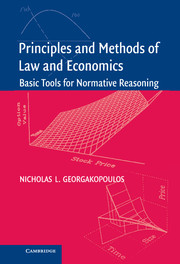Book contents
- Frontmatter
- Contents
- Preface
- INTRODUCTION: INNOVATION IN LEGAL THINKING
- PART 1 PRINCIPLES
- 1 FROM FORMAL LOGIC TO NORMATIVE REASONING
- 2 SOCIAL WELFARE VERSUS MORAL PHILOSOPHY
- 3 FROM POLITICAL PHILOSOPHY TO GAME THEORY
- 4 THE IMPORTANCE OF DISTRIBUTION OF WEALTH
- 5 COASE AND LAW'S IRRELEVANCE
- 6 MORE FAILURES OF COASEAN IRRELEVANCE
- PART 2 METHODS
- APPENDIX A MEINHARD V. SALMON 249 N.Y. 458 (1928)
- APPENDIX B GLOSSARY
- APPENDIX C MATHEMATICA NOTEBOOKS
- Index
3 - FROM POLITICAL PHILOSOPHY TO GAME THEORY
Published online by Cambridge University Press: 24 July 2009
- Frontmatter
- Contents
- Preface
- INTRODUCTION: INNOVATION IN LEGAL THINKING
- PART 1 PRINCIPLES
- 1 FROM FORMAL LOGIC TO NORMATIVE REASONING
- 2 SOCIAL WELFARE VERSUS MORAL PHILOSOPHY
- 3 FROM POLITICAL PHILOSOPHY TO GAME THEORY
- 4 THE IMPORTANCE OF DISTRIBUTION OF WEALTH
- 5 COASE AND LAW'S IRRELEVANCE
- 6 MORE FAILURES OF COASEAN IRRELEVANCE
- PART 2 METHODS
- APPENDIX A MEINHARD V. SALMON 249 N.Y. 458 (1928)
- APPENDIX B GLOSSARY
- APPENDIX C MATHEMATICA NOTEBOOKS
- Index
Summary
The acceptance of democratic traditions misleads some into objecting to economic analysis of law on the basis of a belief in majority rule. The essence of such an objection could be that a proposed interpretation is acceptable only if it follows the majority's will rather than an economic demonstration of its desirability. This chapter shows that majority rule may lead to undesirable outcomes. Thus, legal reasoning that defers to the majority's will may produce undesirable interpretations, whereas legal analysis that relies on economic methods, that is, law and economics, could lead to more desirable ones.
Again, Meinhard v. Salmon can illustrate the importance of the difference between political and economic analysis. Salmon received a lucrative offer from Gerry, a business acquaintance. The offer could have expanded Salmon's business. Unbeknownst to Gerry, Salmon's business, which was the reason for their acquaintance, had a secret partner, Meinhard. If Gerry knew that Salmon operated in two capacities, as an individual and as a member of a partnership, then Gerry may have specified which of the two he selected as the recipient of his offer. Meinhard, the invisible partner, claimed the offer should be treated as made to the partnership. The litigation that Meinhard started eventually reached the highest court of the jurisdiction and the famous American judge, Benjamin Cardozo, and his colleague Andrews, who is almost equally famous for his vocal dissenting opinions. Previously established law did not answer the question directly.
- Type
- Chapter
- Information
- Principles and Methods of Law and EconomicsEnhancing Normative Analysis, pp. 37 - 71Publisher: Cambridge University PressPrint publication year: 2005



